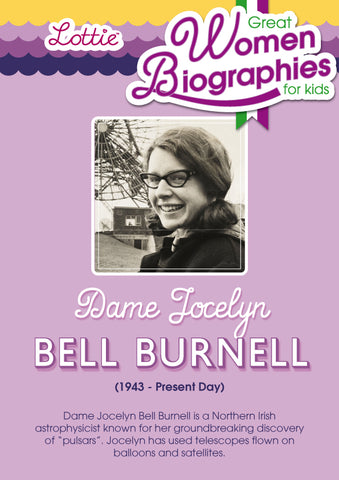Jocelyn’s Childhood
Susan Jocelyn Bell was born on 15th July 1943 in Belfast, Northern Ireland. Her father was an architect and he helped design the Armagh Planetarium.
Jocelyn grew up in Lurgan and attended Lurgan College. She, like all the other girls were not allowed to study science as the girls’ curriculum included subjects like cross-stitching and cooking, however things changed after Jocelyn’s parents had protested against the school’s policy.
Jocelyn failed the 11+ exam, so her parents sent her to Mount School in York which was a Quaker girls’ boarding school.
Jocelyn’s Academic Career
Jocelyn graduated from University of Glasgow with a Bachelor of Science Degree in Natural Philosophy in 1965. She then obtained a PhD from the University of Cambridge in 1969. Here, she worked with others to make a radio telescope.
Jocelyn worked at the University of Southampton from 1968 to 1975. She also worked at the University College London from 1974 to 1982 then the Royal Observatory in Edinburgh from 1982 to 1991. From 1991 to 2001, she was a professor at the Open University.

Susan Jocelyn Bell (Burnell), 1967
Although it is believed that it was Jocelyn that had made this discovery of pulsars, she did not receive recognition in the 1974 Nobel Prize in Physics, though her colleagues Martin Ryle and Anthony Hewish did. This has been a topic of controversy ever since. The Nobel Prize committee were also criticised by Fred Hoyle, with claims of Anthony Hewish stealing Jocelyn’s data.
Awards & Honours
Although she did not share the 1974 Nobel Prize, Jocelyn has been honoured by many different organisations including the Albert A. Michelson Medal from the Franklin Institute of Philadelphia and many, many more.
In 1999, Jocelyn was appointed Commander of the Order of the British Empire for services to astronomy and was later promoted to Dame Commander of Order of the British Empire.
In February 2013, she was considered to be one of the most powerful women in the United Kingdom. In February 2014, she was made President of the Royal Society of Edinburgh, making her the first woman to hold that office.
![]() Fast Shipping*
Fast Shipping*![]() Subscribe to our Newsletter
Subscribe to our Newsletter![]() 🌟 A Walk in the Park Lottie Doll 🌟
🌟 A Walk in the Park Lottie Doll 🌟
















